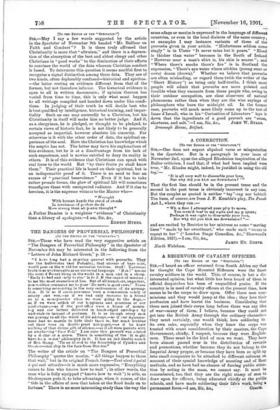THE DANGERS OF PROVERBIAL PHILOSOPHY. LTO THE EDITOR OP THE
'SPECTATOR.")
Sur,—Those who have read the very suggestive article on " The Dangers of Proverbial Philosophy " in the Spectator of
November 9th may be interested in the following from the "Letters of John Richard Green," p. 24 :—
" I have long bad a standing quarrel with proverbs. They are the halfTtruths that Pedantry, that utterer of base coin, would pass on the w.rld for universal verities. Stuff I Uuiversat truth is as unattaiaable as an universal language. ' B •h ! ' means the most d &sent thing in the world in a man and in a sheep. • Early to bed and . arly to rise' is to J. B the sagest of maxims ; to me the moat shameless of lies. But of all trenchant, impudent, non-verities WI:Emend me to your No news is good news.' 'rnere is something astounding in the very recklessness of its assump- tion. It is as if correspondence were a communion solely of misery and woe,—as if we had only recourse to a friend as to a moneylender when we were going to the dogs,— as if we were selfish of our happiness and generous of our misfortunes,—as if the post office were a house of mourn- ing and our letters delivered in black•edged envelopes by undertakers instead of postmen. It is as though every man ran prating to all the world of his mishaps,—as it our Agamein- nons had no mantle to hide their faces in, but must blubber out their woes on double press notepaper,--as if be knew nothing of that divine gift of silence,—as if all were parrots with an everlasting • Poor Pull.' I am sure this proverb was u.inted by a d. ctor or a nurse. There is something of the it might have be. a worse' philosophy in it. It has an indefinable smack of Mrs. Gump. 'Tis an ill end to the friendship of Pylades and Orestes—this slap in the face from Orestes."
The writer of the article on " The Dangers of Proverbial Philosophy " quotes the maxim, " All things happen to those that wait," but in its original French form—Tout vient a point a pi salt attendre—it is much More expressive, "Everything comes to him who knows how to wait" ; in other words, the
man who is fully equipped (" knows how to wait") is able, as Shakespeare puts it. to take advantage, when it comes, of the "tide in the affairs of men that taken at the flood leads on to
fortune." There is no more interesting study than the way the same adage or maxim is expressed in the language of different countries, or even in the local dialects of the same country; as examples I may instance variants of three of the proverbs given in your article. " Misfortunes seldom come singly" is in Ulster "It never rains but it pours." "Blood is thicker than water" becomes in the South of Ireland " However near a man's shirt is, his skin is nearer "; and " Where there's smoke there's fire " is in Scotland the expression, " There's aye water where stirkies (young steer or cows) aroma (drown)." Whether we believe that proverbs are often misleading, or regard them (with the writer of the "Short History") as being only half-truths, I think most people will admit that proverbs are more pointed and forcible when they emanate from those people who, owing to their outdoor occupation, are close observers of natural phenomena rather than when they are the wise sayings of philosophers who burn the midnight oiL In the former case, proverbs will much more likely come up to the test of Isaac d'Israeli, who in his" Curiosities of Literature" lays it down that the ingredients of a good proverb are " sense, shortness, and salt."—I am, Sir, &c., Jonzi W. BIERS. Dreenagh Bowe, Belfast.


























































 Previous page
Previous page